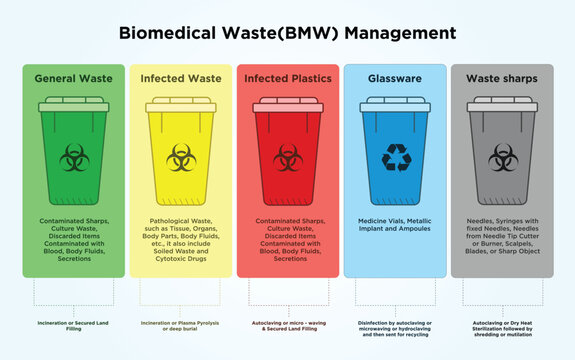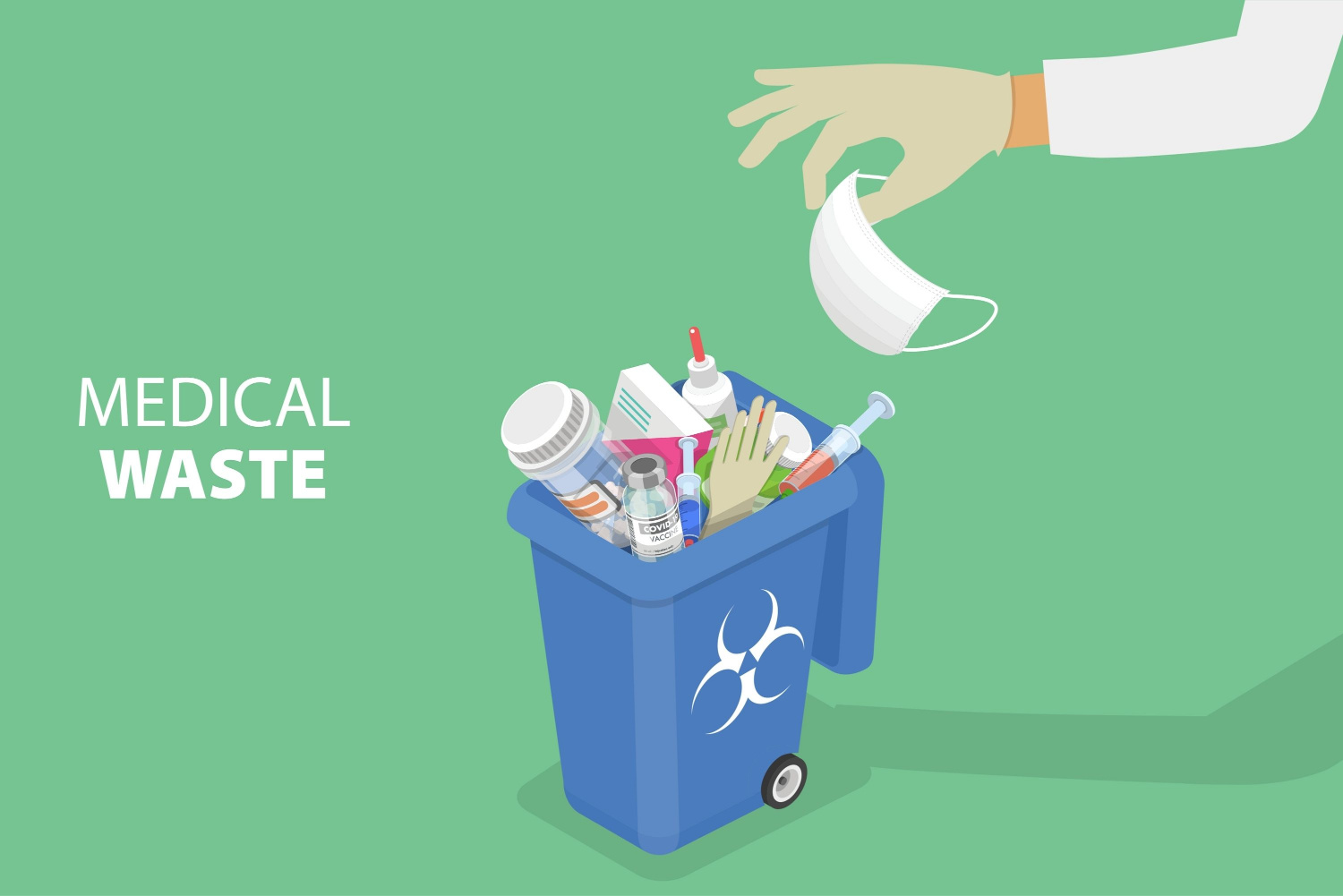Safe and Effective Medical Waste Removal: Your Trusted Environmental Companion
Wiki Article
The Significance of Correctly Handling Medical Waste
Appropriate administration of clinical waste is of utmost value in healthcare facilities. The handling, storage space, and disposal of medical waste call for strict adherence to standards and guidelines to guarantee the safety and security of individuals, healthcare workers, and the setting. Healthcare facilities have legal and governing commitments to appropriately take care of clinical waste, and failure to comply can result in fines and lawful effects.Health Risks Related To Improper Waste Administration
Inappropriate management of clinical waste poses substantial health and wellness risks to both healthcare employees and the public - WasteX Medical Waste Disposal. Clinical waste, which includes sharps, infectious products, drugs, and radioactive compounds, calls for appropriate handling and disposal to stop the spread of infections, injuries, and direct exposure to hazardous substances
One of the key wellness dangers related to incorrect clinical waste management is the transmission of transmittable diseases. Healthcare workers who enter call with polluted waste might acquire conditions such as HIV, liver disease, or other bloodborne microorganisms. If clinical waste is not properly disposed of, it can pollute the environment, water resources, and even food, leading to the spread of diseases within the community (medical waste disposal service).
Improper waste monitoring can likewise result in injuries, particularly from sharps such as needles, scalpels, and busted glass. Unintended needle punctures can result in the transmission of bloodborne conditions, while cuts from sharp items can cause extreme injuries and infections.
In addition, the incorrect disposal of pharmaceutical waste can cause the contamination of water products. When run out or extra medicines are purged down the bathroom or discarded wrongly, the chemicals can seep into water sources, impacting marine life and potentially entering the human food web.
Ecological Influence of Incorrectly Disposed Medical Waste
Among the substantial effects of inadequate monitoring of clinical waste is its damaging influence on the environment. Poorly disposed medical waste postures a serious hazard to ecological communities, water bodies, and the overall equilibrium of the atmosphere. WasteX Medical Waste Disposal. The harmful products contained in clinical waste, such as transmittable agents, pharmaceuticals, and chemicals, can infect air, water, and dirt, resulting in extensive air pollution and destructionWhen clinical waste is not effectively set apart, treated, and disposed of, it can discover its means into water bodies via inappropriate garbage dump methods or illegal dumping. This can result in the contamination of groundwater and surface water, affecting water life and potentially polluting drinking water sources. The release of unsafe chemicals and pharmaceuticals right into the atmosphere can interrupt ecological communities and injury both pet and plant varieties.
Additionally, incorrect incineration of medical waste can release toxic toxins, including dioxins and furans, into the atmosphere. These toxins have been connected to numerous health and wellness problems, consisting of respiratory system issues, reproductive conditions, and even cancer. The release of greenhouse gases throughout incineration likewise adds to environment change.
To mitigate the ecological effect of improperly disposed medical waste, it is crucial to execute proper waste management methods. This consists of segregation of waste at the resource, suitable therapy methods, and safe disposal strategies. By doing so, we can lessen the pollution and safeguard the setting from the unsafe repercussions of medical waste mismanagement.
Legal and Governing Commitments for Medical Care Facilities
In order to attend to the environmental effect of incorrectly disposed clinical waste, medical care centers are called for to abide by lawful and regulative obligations. These obligations are implemented to make sure the proper handling, storage, transportation, and disposal of clinical waste in a safe and ecologically accountable manner.One of the essential lawful responsibilities for medical care facilities is to acquire the necessary licenses and licenses for handling medical waste. This includes getting a waste generator recognition number and abiding by federal, state, and neighborhood laws. Healthcare facilities have to likewise maintain in-depth documents of the kinds and amounts of medical waste produced, in addition to the approaches utilized for its disposal.
Additionally, health care centers have to implement proper segregation and product packaging procedures for various sorts of clinical waste, such as sharps, Continue infectious waste, and pharmaceutical waste - medical waste disposal service. This includes making use of watertight containers, biohazard bags, and sharps containers that meet regulatory criteria
Healthcare facilities are likewise responsible for making sure that their team get ideal training on the appropriate handling and disposal of clinical waste. This consists of training on infection control, individual safety tools, and waste monitoring methods.
Finest Practices for Safe Handling and Disposal of Medical Waste
To guarantee the risk-free handling and disposal of clinical waste, healthcare facilities must apply finest methods. These practices are important to shield the health and wellness of both healthcare workers and the general public. The proper monitoring of clinical waste is important in stopping the spread of infectious illness and minimizing environmental contamination.One of the most effective practices for risk-free handling and disposal of medical waste is segregation. Medical care facilities must divide various sorts of clinical waste, such as sharps, contagious products, and pharmaceutical waste, to prevent cross-contamination. Proper labeling and color coding of waste containers also play a vital function in making certain the appropriate partition of medical waste.
An additional vital ideal practice is using proper containers for storing and carrying clinical waste. These containers should be watertight, puncture-resistant, and correctly sealed to avoid any type of feasible release of hazardous materials. In addition, healthcare facilities ought to develop clear procedures for the collection, storage, and transport of clinical waste to lessen the risk of exposure and contamination.
Furthermore, health care centers should train their staff on the correct handling and disposal of medical waste. Regular training sessions and correspondence course ought to be carried out to keep healthcare employees updated on the newest standards and policies. This will certainly aid make sure that everyone included in the procedure knows the potential risks and is furnished with the required expertise and abilities to handle clinical waste securely.
Education and Training for Healthcare Professionals in Waste Management
Medical care experts require thorough education and training in waste monitoring to ensure the proper handling and disposal of clinical waste. The administration of medical waste is a critical element of healthcare operations as it directly affects the health and wellness of both health care employees and the public. Correct education and training furnish health care experts with the needed understanding and abilities to dispose and manage of medical waste in a environmentally liable and safe way.Education and learning and training programs for health care experts in waste management cover an array of topics, including the category and partition of medical waste, correct product packaging and transport, storage space and labeling needs, and the use of personal protective equipment. These programs also stress the relevance of adherence to local, national, and worldwide guidelines and guidelines governing clinical waste management.
By obtaining detailed education and training in waste monitoring, health care specialists can properly minimize the risks connected with medical waste, such as the transmission of contagious diseases and the potential harm to the atmosphere. WasteX Medical Waste Disposal. Moreover, trained professionals can identify and carry out finest practices that promote sustainability and effective waste administration practices within healthcare facilities.
Continual education and training in waste administration need to be an ongoing concern for health care professionals, as waste monitoring techniques and regulations might evolve gradually. By staying up-to-date with the newest advancements in waste monitoring, healthcare professionals can ensure that they are outfitted with the knowledge and abilities required to make educated choices and add to the overall enhancement of waste management practices in medical care setups.

Final Thought
Finally, correct administration of clinical waste is vital to mitigate health and wellness risks and reduce the ecological effect. Medical care centers have regulatory and legal responsibilities to ensure secure handling and disposal of medical waste. Adhering to ideal techniques and giving education and learning and training for medical care professionals in waste monitoring are essential for maintaining a healthy and risk-free environment. By adhering to these guidelines, health care centers can safeguard public health and preserve the integrity of our environments.
Healthcare professionals call for thorough education and learning and training in waste administration to make certain the proper handling and disposal of medical waste - medical waste removal. The management of clinical waste is an essential part of healthcare procedures as it straight impacts the wellness and safety and security of both health care employees and the basic public
Report this wiki page